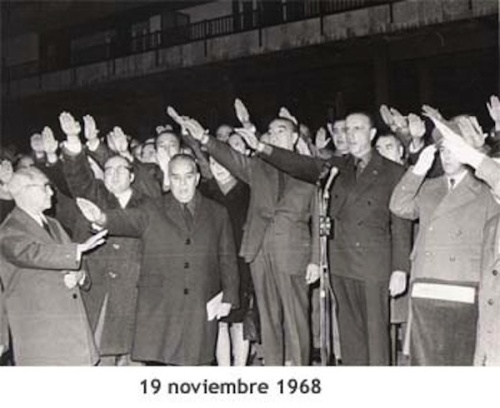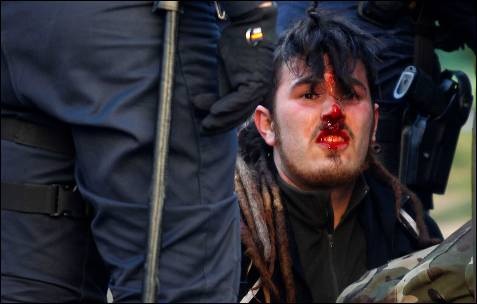From Evernote: |
Collaboration, with our European partners |
This weekend at the Partido Popular conference, there was a commemoration of Manuel Fraga, the Francoist minister who became leader of Alianza Popular, the precursor to Partido Popular. During a homage, the current Prime Minister (in Spanish, Presidente del Gobierno, or ‘president of the government’) Mariano Rajoy declared that Fraga was “was also the President of the Government”, and that “I am president because Fraga gave me an opportunity”. A gallery of images from Fraga’s life was placed on display at the conference.
The general impression of Spain’s political composition from the outside coincides quite conveniently with the impression that its power elites wish to convey: a modern democracy that made a decidedly swift and painless transition from the dictatorship of the Franco era, arising from the spirit of generosity and commitment to coexistence made by all those who took part in the transition, and rapidly integrated with the rest of Europe, becoming a member of the European Community.
These things are often met with a degree of public defiance, the product of long-established practices of resistance and authentic democratic activity by left-wing and popular movements. But the decisive trend in Spain presently, as elsewhere, is towards a greater concentration of wealth and power in the hands of oligarchs.
How best to make sense of this return of the repressor? The brutal police assaults on students in Valencia, the veneration of despotic authority and the assaults on social rights -as well as the relentless appropriation of rhetoric usually associated with emancipatory traditions (the Partido Popular is the party of the workers, claimed the Partido Popular general secretary last week)- are all characteristics of a restoration of ‘sociological Francoism’. What is different now however, here as elsewhere in Europe, is the degree of transnational collaboration.
The implementation of the labour ‘reform’, the modifications to the hitherto sacred constitution to prioritise debt repayment over social services, the privatisation of health and education and the deliberate erosion of the social safety net are all carried forward with an impetus supplied from Brussels and Frankfurt. Save the odd baroque genuflection in front of a crucifix, there is little contradiction between the sociological Francoism manifest in a Partido Popular apparatchik and the technocratic mien of your average Troika official.
That said, trans-European collaboration in the destruction of democracy is nothing new in itself. Recall the barbarism of German and Italian planes bombing civilians in Málaga in 1937 as an illustration. People in Ireland would do well to remember that when this happened, the Irish Catholic Church, the Irish Independent and Fine Gael were all on the same side as, Franco, Hitler and Mussolini.
What is different now, is the fact that this destruction is being openly conducted by institutions whose purpose, it had long been widely assumed, was to preserve and strengthen a post-war democratic order. Said institutions operated under the auspices of what was named ‘the European project’. Thus to say you supported ‘the European project’ allowed you to express, in the roughest of terms, opposition to what had preceded it -continent-wide barbarism and destruction, chauvinistic nationalism- without having to say anything consequential about the economic system that underpinned it, or the legal framework that guaranteed this system: that is, as long as you were down with the cosmopolitanism of it, there was no need to worry about what Perry Anderson described as the ‘vast zone of increasingly unbound market exchange’. Rather, with your attention drawn towards the social democratic carrot Julienne and away from the neoliberal aluminium baseball bat, you were more likely to conclude that the ‘gap between the people and their rulers over the progress of the European Union’ ‘will not actually have grave consequences in the foreseeable future’.
Well, the grave consequences are already here, with state repression and systematic impoverishment of growing swathes of the population in order to satisfy the demands of financiers and speculators. As Monedero notes in response to the Valencia beatings, this is the State converted into an organ of repression in order to dismantle the welfare state. Far from operating as a bulwark against the erosion of democracy, European institutions are the tools for its dismantling. As Wolfgang Munchau of the Financial Times notes, from the point of view of European rulers, success is no longer compatible with democracy.
What spirits of the past will be anxiously conjured up by the counter-revolutionaries for this new scene in world history? What names will they borrow? Those of us with an eye on Ireland might wish to recall that Michael Noonan –the Minister for Finance whose party is the same party that supported the fascist forces in the Spanish Civil War- in his budget speech this year, to justify the troika-driven measures as a bid for independence, cited Richard Mulcahy approvingly. Mulcahy, as Noonan and the assembled deputies know full well -was a decisive member of a deeply authoritarian government had overseen the assassination of republican prisoners, including Liam Mellows. A minor example of how global capitalism conjures local authoritarian productions in order to sustain its increasingly primitive processes of accumulation.







